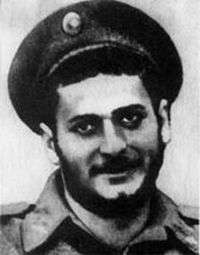Albert Agarunov
| Albert Agarunov | |
|---|---|
|
Albert Agarunov - National Hero of Azerbaijan | |
| Born |
April 25, 1969 Baku, Azerbaijan SSR |
| Died |
May 7, 1992 (aged 23) Shusha |
| Burial place | Baku, Azerbaijan |
| Nationality | Jewish |
| Occupation | Military |
| Awards | National Hero of Azerbaijan |
Albert Agarunovich Agarunov (Azerbaijani: Albert Aqarunov) (25 April 1969 – 7 May 1992) was a Starshina of the Azerbaijani Army who died during the Nagorno-Karabakh War. He was among the last Azerbaijanis to defend Shusha, which was occupied by Armenian forces on May 9, 1992.
Life
Albert Agarunov was born in a Baku suburb to Mountain Jewish parents [1][2] Agarun (an oil-worker and Quba-native) and Leah Agarunov; he was one of the family's ten children. After obtaining a degree in technology, he started working at a machine-building factory as a metal turner.
Military service
He served in the Soviet Army from 1987 to 1989. In 1991, he voluntarily enlisted in the Azerbaijani Army in the war against Armenia Azerbaijan's over Nagorno-Karabakh region. According to Azerbaijani sources, on December 8, 1991, Agarunov along with driver Agababa Huseynov managed to disable nine Armenian tanks and two armoured trucks.[3] He served as a tank commander in the defense of Shusha in May 1992, when the Armenians launched the successful assault to take this strategically important town. He took part in a famous tank engagement against a T-72, commanded by Gagik Avsharian, knocking it out of commission on the road leading to the town.[4]
Agarunov was killed several days later on the road connecting Shusha to Lachin.[5] He was posthumously awarded the title of the National Hero of Azerbaijan and was buried at Martyrs' Lane in Baku in May 1992.
References
- ↑ "Альберт Агарунович Агарунов - танкист, Национальный герой Азербайджана.". Aksakal Media. Retrieved 2016-10-13.
- ↑ Video on YouTube
- ↑ (Russian) Jabrayilli, G. He Gave His Life for His Homeland, Golos Karabakha. Retrieved 22 May 2007.
- ↑ De Waal, Thomas (2003). Black Garden: Armenia and Azerbaijan Through Peace and War. New York: New York University Press, pp. 178-179.
- ↑ De Waal. Black Garden, p. 314, note 42.
